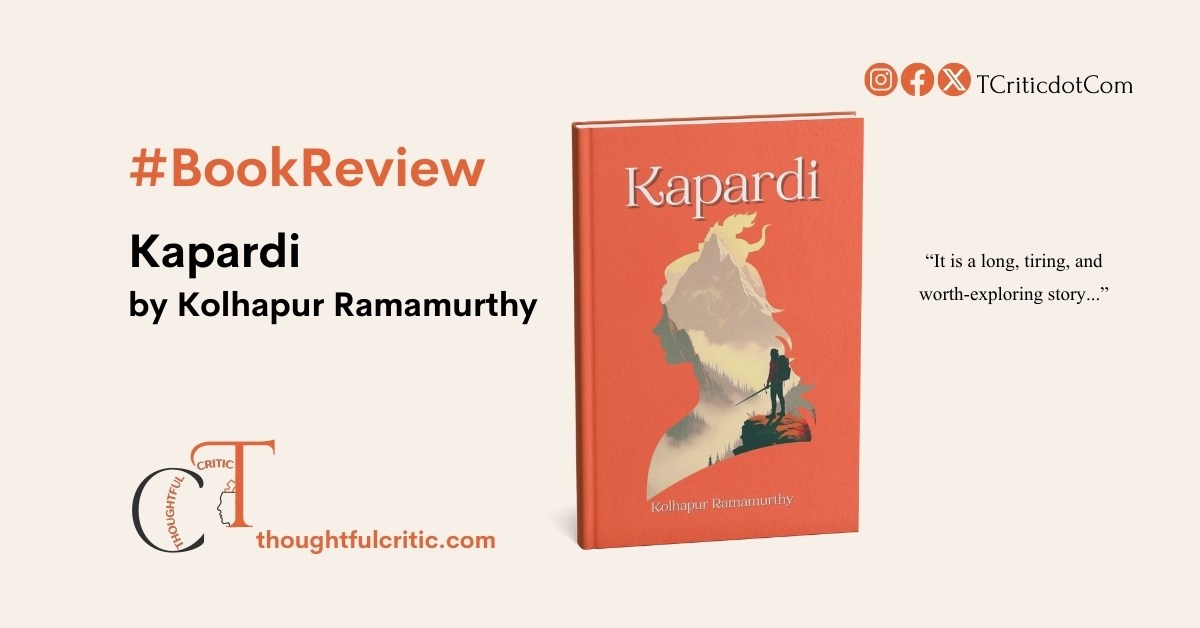Kapardi, when I first heard I was expected to read and review this novel, I was surprised and intrigued by it. However, when I had a detailed look at the book cover, it instantly grabbed my attention. The perplexity of its title turned into curiosity and intrigue. Though it has its volume and fair share of pages, I wanted to read the novel as soon as possible. At its core, Kolhapur Ramamurthy’s Kapardi is a masterful blend of myth, mystery, espionage, and geopolitics, making it a standout in contemporary Indian fiction. The novel explores India’s cultural heritage, environmental challenges, and the delicate balance between tradition and modernity. With its richly drawn characters, intricate plot, and profound thematic depth, Kapardi is a compelling read that intellectually and emotionally resonates.
In this article, I will share my review of the novel with the readers of the Thoughtful Critic platform. I hope this review meets the joy I experienced while reading the work.
Set against the fictional Kedareshwara Temple backdrop, the novel follows Kapardi, an unassuming sociology lecturer, drawn into a vortex of extraordinary events. The temple, a symbol of spiritual and ecological resilience, becomes the focal point of a conspiracy threatening its sacred rituals and the fragile balance between tradition and progress. Kapardi, alongside Shazia, a determined CBI officer, embarks on a perilous journey to uncover the truth and protect the temple from internal and external threats. The narrative builds to a climactic showdown in the temple sanctum, delivering a resolution that is as thrilling as it is reflective.
One of the novel’s most striking features is its seamless integration of diverse genres. The mythological elements are intricately woven into the narrative, offering a rich tapestry of rituals, hymns, and symbolic undertones that ground the story in India’s spiritual heritage. The mystery surrounding the temple’s secrets keeps readers on edge, while the espionage and geopolitical intrigue add complexity and contemporary relevance. The portrayal of intelligence operations and international conspiracies is both realistic and engaging, making the story universally appealing while remaining deeply rooted in Indian culture.
Ramamurthy’s characters are well-developed and multifaceted. Kapardi’s transformation from an ordinary lecturer to a reluctant hero is compelling, and his intellectual depth and moral clarity make him a relatable and inspiring figure. Shazia’s journey from a sceptical investigator to a custodian of heritage adds emotional depth to the narrative. The antagonist, Hamid Mir, is a complex character driven by personal vendettas, adding emotional weight to the conflict. Supporting characters like Nachiketh, Vidyaranya Saraswati, and Sivananda Saraswati enrich the story, each contributing to the novel’s complexity.
Themes and Central Issues:
At its core, Kapardi by Kolhapur Ramamurthy is a profound celebration of Indian ethos and a clarion call for environmental conservation. The novel transcends the boundaries of a conventional thriller by embedding its narrative in India’s rich cultural and spiritual heritage while simultaneously addressing pressing ecological issues. The Kedareshwara Temple, around which the story revolves, is not merely a backdrop but a living, breathing entity that embodies resilience, spirituality, and ecological harmony. It is a powerful symbol of the interconnectedness of humanity and nature, urging readers to reflect on the delicate balance that sustains life.
The novel’s exploration of environmental themes is both timely and thought-provoking. By linking the temple’s preservation to broader ecological concerns, Ramamurthy underscores the relevance of ancient wisdom in addressing modern challenges. The temple’s rituals and traditions are depicted not as relics of the past but as vital practices that hold the key to sustainable living. This philosophical underpinning elevates Kapardi beyond a mere thriller into an enlightening and entertaining narrative.
Through its vivid portrayal of the temple and its surroundings, the novel invites readers to contemplate their relationship with the environment. It challenges the modern disconnect from nature and highlights the importance of sustainable practices. The characters’ journeys, particularly Kapardi’s transformation from an ordinary lecturer to a custodian of heritage, mirror the broader struggle to preserve ecological and cultural legacies. In doing so, Kapardi tells a gripping story and imparts a crucial message about the enduring value of tradition and the urgent need for environmental stewardship. This dual focus on cultural richness and ecological responsibility makes Kapardi a uniquely compelling and relevant work in contemporary fiction.
Literary Merit: Strengths and Limitations
Ramamurthy’s writing is marked by its depth and detail. His meticulous research is evident in the authentic depiction of the temple and its rituals, immersing readers in its grandeur and natural beauty. The narrative structure is meticulously crafted, each chapter revealing a new plot layer. However, the pacing occasionally falters, particularly in the early chapters, where the intricate details of the rituals might overwhelm some readers. While this depth ultimately enriches the story, a more balanced approach to exposition could have enhanced its accessibility. Yes, because of its depth and getting into the abyss to protect the revelation for too long, the novel might lose the readership of a big chunk of readers who love to read fiction that does not challenge their critical thinking and patience. While many traditional readers could see it as a virtue in any good story, contemporary readers, especially the gen-z, with its hurried framework, might do away with the book… relatively too soon! And let me admit that this limitation argument is purely personal and subjective. It should vary reader by reader.
The Espionage Angle:
The novel’s espionage elements are intricately woven into the narrative, with the ISI’s covert operations driving much of the plot. The portrayal of terrorist activities, including the murders of geologists, the hijacking of a school, and the smuggling of Semtex explosives, adds a layer of suspense and urgency. The CBI’s counter-espionage efforts, supported by MI-5 and RAW, provide a realistic and engaging depiction of intelligence operations. The novel explores geopolitical tensions and their impact on national security is timely and thought-provoking.
What Distinguishes the Novel?
Kapardi stands out for its remarkable ability to seamlessly blend entertainment with enlightenment, offering readers an intellectually stimulating and emotionally engaging narrative. The novel’s thrilling plot, replete with suspenseful twists and turns, ensures that readers remain captivated from start to finish. At the same time, its philosophical depth invites introspection, urging them to reflect on broader themes of heritage, spirituality, and ecological responsibility. By masterfully integrating myth, mystery, espionage, and geopolitics elements, Ramamurthy crafts a narrative uniquely rooted in Indian culture and universally resonant, appealing to a diverse audience. Moreover, the novel’s emphasis on preserving cultural heritage and advocating for environmental conservation lends it a timely relevance, serving as a poignant reminder of the enduring value of tradition and the urgent need for a harmonious coexistence with nature. This dual focus on storytelling and thematic richness elevates Kapardi beyond conventional fiction, making it a thought-provoking and impactful read that resonates long after the final page is turned.
Conclusion: A Must-Read Work
Kolhapur Ramamurthy’s Kapardi is an ambitious and rewarding novel that transcends the boundaries of conventional storytelling. Its intricate plot, rich themes, and vivid narrative make it a standout work in contemporary Indian fiction. By intertwining a gripping thriller with a profound exploration of Indian ethos, the novel achieves a rare balance between entertainment and enlightenment. While its depth and detail might challenge some readers, these qualities ensure that Kapardi leaves a lasting impression. For anyone seeking a story that is as thought-provoking as it is thrilling, Kapardi is a must-read.
Final Verdict
Kapardi is a thought-provoking thriller that skilfully bridges the gap between ancient traditions and modern dilemmas. Its compelling narrative, rooted in Indian philosophy and environmental advocacy, positions Kolhapur Ramamurthy as a promising voice in contemporary fiction. The novel is not just a tale of suspense but a tribute to the enduring relevance of cultural heritage in shaping a sustainable future. If you’re looking for a novel that combines intellectual engagement with emotional resonance, Kapardi is an essential read.
Get a copy from Amazon India – click here.
Review by Alka for Thoughtful Critic
Kapardi by Kolhapur Ramamurthy, a detailed book review
-
Thoughtful Critic's Rating
Summary
It is a long, tiring, and worth-exploring story…




